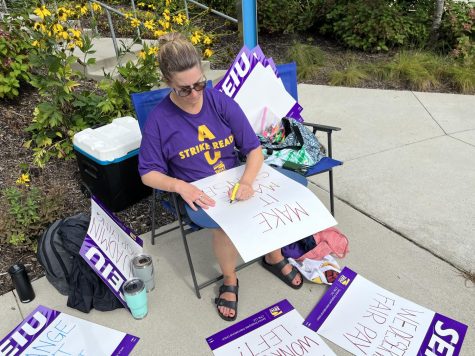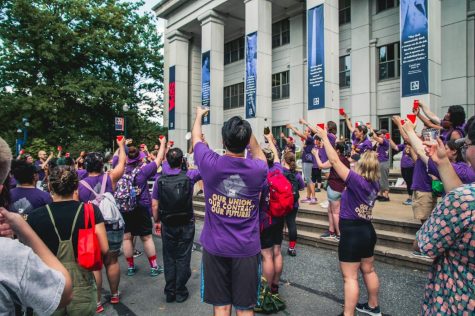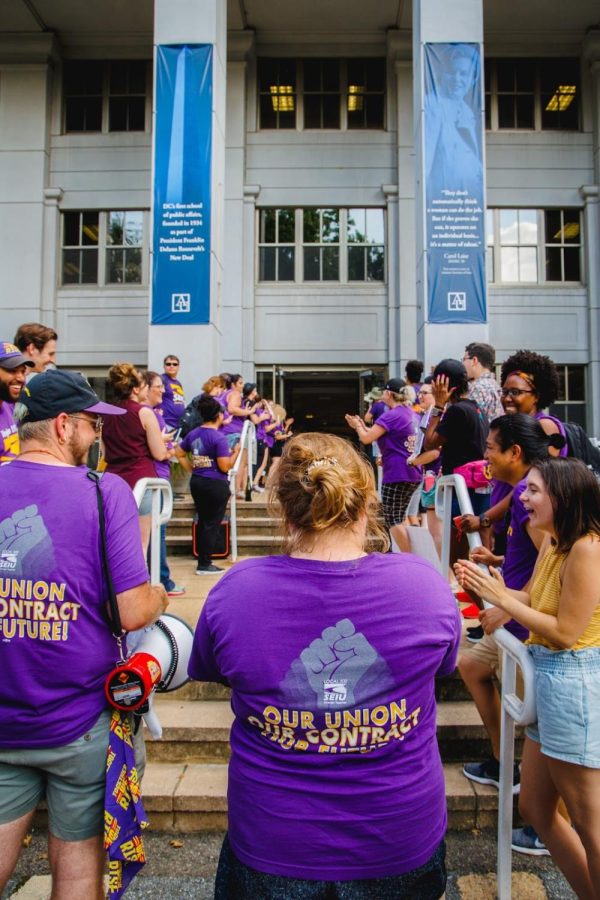Looking back at the AU Staff Union’s Battle for a Contract
December 16, 2022
It’s been nearly four months since the American University Staff Union held a strike on Aug. 21 after the university could not agree on better wages and benefits.
Exactly two months after the strike began, on Oct. 21, the university signed the agreed-upon contract. The news was shared on the union’s TikTok.
The decision to protest was announced on Aug. 11 on the AU Staff Union’s Twitter feed. The five-day strike aligned with AU move-in for students and the first week of AU’s Washington College of Law classes. The strike ended on Aug. 26, with the union reaching an agreement with the university.
As of 2021, American University wages for all non-instructional full-time staff are an average of $80,770, according to Unistats. The lowest salaries are given to those who work in production, transportation and material moving, averaging $38,973 per year.
With inflation at 8.5% across the country, according to the Consumer Price Index, the cost of living in the District is 53% higher than the national average, according to Rent. In 2020, the average personal consumption of residents in the District was $65,169, according to the Bureau of Economic Analysis.
AU offered, on Aug. 19, a 4% salary increase broken down to 2.5% across the board and a 1.5% performance pay pool, according to an email sent by the Provost. However, in a letter to Provost Starr, the staff union asked for a 9% wage increase over two years. The union also wants AU to lower healthcare costs and improve staff retention.
Michael Gan, adjunct associate professor of law at the Washington College of Law who teaches Labor and Employment Law, said the rise in unionization around the country contributed to the strike’s success.
“There have been more petitions filed with the National Labor Relations Board so far this year than all of last year,” Gan said.
During the week of the strike, the union marched through campus, taking over the roadways and the university’s quad. AU’s incoming first-year class marched out during convocation, a celebration for first-year students, in support of the union. Union members and their supporters wore purple shirts and held signs during the protest.
“Who’s got the power? We got the power! What kind of power? Union power!” chanted the union as they marched through Tenleytown and AU’s main campus.
Gan said unions go through several steps to get a new contract. “The parties have a collective bargaining agreement for a set number of years and before the contract expires, the parties meet,” Gan said.

Agreement renewal will begin with both parties meeting, Gan said.
“They begin talking about the next agreement, and if they can reach a tentative agreement, an agreement that is reached by representatives of the administration and representatives of the union, then it is brought back to the union membership,” Gan said.
On Aug. 26, the union and university agreed to end the strike. The union celebrated its victory in front of the School of Public Affairs.
“We have reached tentative agreements on contracts for both the adjunct faculty and the Provost and Enrollment division staff unit,” President Sylvia Burwell said in an email sent out to the university on Aug. 26.
When unions reach a tentative agreement, it is explained in multiple meetings, and a vote will take place deciding to ratify the tentative agreement, Gan said.
“The vote needs to be at least 50% plus one,” Gan said.
According to an AU Staff Union Instagram post, the union ratified the labor contracts on Sept. 16, with 99% of members signing the contract for both staff and adjunct professors.
Samuel Sadow, union press coordinator and visual resources curator for the department of art, said that while no contract is perfect, the agreement is a “transformative victory for staff at AU.”
“It guarantees that AU will become a workplace where staff is guaranteed more respect, a prominent voice in their working conditions, more job security, fair raises, a more equitable pay structure and more affordable healthcare,” Sadow said.
Matthew Bennett, chief communications officer for AU, talked about the university’s role in negotiations saying “their core principles of focusing on the people, advancing equity in the community, and being responsible with resources.”
“We look forward to implementing the agreements and our overall budget framework, which includes historic investments in compensation for our staff and faculty,” Bennett said. “The investments we are making in compensation and financial aid are fundamental to achieving our mission and our strategy.”
Bennett said that AU respects the right of the community to voice their opinions through unionization.
Those who were part of the union participated in the strike. Tawna Hodson, a senior administrative assistant in the clinical program at AU’s Washington College of Law, lives in Maryland because she cannot afford to live closer to her work, which she said led her to go on strike with the union.
“I have to live 45 minutes to an hour away in order to afford it, and I don’t have a washer and dryer in my apartment,” Hodson said, “I don’t have some basic things that you really need.”
Union member Rachel Feinstein, the program coordinator for the WCL Clinical program, attended the strike on the first day, Aug 21. According to their website, the WCL clinical program allows students to provide legal services to 11 in-house clients.
Feinstein said the university had negatively impacted her as a program coordinator as her office began losing staff members. Feinstein said she and her co-worker were doing the work of five people for about six months and found out verbally from the university that it would not fill the positions they were covering for.
“The problem with this is it leaves the clinical program open to malpractice lawsuits because we do not have sufficient administrative support,” Feinstein said. “I really hope that they see that what they’re doing to us is not okay, and that the staff here matter and that they would not have the university they have without us.”
Now with the contract, Feinstein said she will be getting a meaningful pay raise for the first time since starting at the university three and half years ago. She said she sees this contract as a way for the staff to get a supportive work environment and job security.
The offer that was formerly on the table on Aug. 25 was a 10.5% increase in across-the-board salaries with 4.6% in the first year, Burwell said in an email.
In an Instagram post by the AU Staff Union account on Sept. 9, the union said what the new contract will contain. It includes guaranteed raises totaling 5.5% for the next two years, annual raises based on years of service for long-term staff and ensures full-time staff employees make at least $40,000 a year.
In addition, the contract ensures protection from layoffs or firing without just cause, better advancement opportunities and more affordable insurance policies.
In an email sent to adjunct professors around campus, the adjunct contract would increase minimum course pay by 22% by the fall of 2024. The email stated the original offer from AU was a $100 increase over the same period.
However, the university did not sign the contract for two weeks despite it being ratified. The benefits and salary updates cannot start until the university has signed the contract, according to the staff union Instagram post from Oct. 3.

The same post announced that the unions plan to sit in from Wednesday, Oct. 5, to Friday, Oct. 7, from 11:30 a.m. to 1:30 p.m. at the people’s lawn, which is outside Burwell’s office. The union said they aimed to remind the university that they needed to sign the ratified contract.
Gan said he was unsure why the administration had not signed the contract immediately but that after the ratification, there is typically a ceremonial signing showing the uniting of both parties.
The university signed the contract on Oct. 21. Gan said that after the contract is signed and installed, the union will take on the role of enforcer, ensuring the university follows through with its contract.
“Helping to administer the contract, making sure that the right wages are paid, that whatever terms or conditions they’ve negotiated actually happen,” Gan said.
The TikTok announcement from the staff union that the university signed the contract was captioned, “Our contract is officially signed! Up next: enforcement.”
Feinstein said her strike experience was like no other, saying it was one of the most stressful and inspiring weeks of her life.
“I was awed and inspired by the determination and fight I saw in my co-workers; humbled by the support of our students and faculty, and disappointed by the fact that the administration forced us to strike for the full week before agreeing to come back to the bargaining table,” Feinstein said




